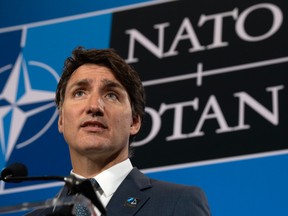‘Government policy without money is basically rhetoric,’ says David Perry, head of the Canadian Global Affairs Institute
Article content
The Trudeau government is trying to assure NATO allies it’s moving in the direction of spending two per cent of Canada’s GDP on defence. Meanwhile, billions of dollars committed to new military equipment is being handed back, lapsed, re-profiled or simply not requested by the Department of National Defence.
“Government policy without money is basically rhetoric,” chides David Perry, the PhD in defence procurement heading up the Canadian Global Affairs Institute, a non-partisan think tank in Ottawa.
Advertisement 2
Article content
Perry has studied Canada’s bureaucratic defence procurement process — clogged with bureaucrats from Public Services and Procurement Canada, National Defence, Innovation, Science and Economic Development Canada and Treasury Board — and can follow the money.
In just the past few years, David confirms, Canada’s Department of Defence failed to spend over $9 billion that was in its budget or the government’s fiscal framework for capital acquisitions under Strong, Secure, Engaged (SSE) — Canada’s defence policy. While there’s a general phenomenon across the federal government of departments asking for money and not being able to spend it by the year-end, thus having the money lapse, Perry reports, “it’s been a particularly pernicious problem at National Defence.”
“We took way too long getting that money moving and actually getting it out the door,” Perry says, and now it’s being exposed to a return of normal levels of interest. He’s not alone in his concerns. Canada’s Parliamentary Budget Officer (PBO) — an independent financial expert tasked with tracking planned and actual capital expenditures by the federal government — is raising the same red flags.
Article content
Advertisement 3
Article content
Canada has lost buying power at a time when the “international defence industrial market is going bananas, supplying the largest conflict in Europe in 80 years, plus the Middle East, plus everybody preparing to deal with the China contingency,” Perry continues, more urgently.
Not only will Canadians pay far more to fund defence purchases as a result of this flawed procurement process, there are less obvious yet potentially graver hits — to our efforts to recruit and retain military personnel, to our reputation with allies, and to our state of military preparedness. “For the near term, things are pretty grim for the Armed Forces,” Perry cautions, “in the next five-year window, the cupboard is pretty bare.”
“If you ask the Air Force, right now, what they could commit to a real contingency, it’s virtually nothing,” Perry says. For the Navy, “unless it was a real catastrophe, they wouldn’t really want to send our upgraded frigates because of the age, the structure of the hull; for a high-intensity conflict, you wouldn’t want to send something that was built 32 years ago, that’s been sitting in salt water, rusting that long and having all the systems age out.
Advertisement 4
Article content
“Our allies have made clear that they actually see a reputational problem with the performance of our procurement system,” Perry says. And that’s left us on the outside, looking in, on initiatives like AUKUS (the security arrangement with the U.K., the U.S., and the Australians) because, Perry reports: “One, they don’t think that we’ve been serious about it; two, we haven’t committed enough real resources to do it; and then the third piece is they want to see us actually come forward with a credible mechanism to translate a commitment of money and intent into an actual acquisition of something.”
Basically, Perry concludes, our allies don’t have confidence in our ability to take a large assignment of money from the government and go buy something in a timely fashion.
Recommended from Editorial
So much has been said about the abysmal state of Canada’s defence procurement, it’s difficult to imagine any young leader being motivated to delve into this morass. Yet this articulate, level-headed, 41-year-old not only has the patience to follow the money, Perry is highly motivated to see Canada do procurement better. “Having just made a commitment to spend two per cent of GDP (on defence) eight years from now, there’s no way to actually achieve that, I don’t think,” he says, “without some meaningful procurement reform.”
Advertisement 5
Article content
Probes into Ottawa’s hamster wheel of procurement red tape have been conducted by outside consultants, government-led committees, and most recently, by the Standing Committee on National Defence. This all-party federal committee of MPs, chaired by John McKay, an Ontario Liberal representing the federal riding of Scarborough—Guildwood, recently released a report with 36 recommendations for reform.
In a late August “Defence Deconstructed” podcast hosted by Perry, McKay went on the record saying “it was blindingly obvious” the federal defence procurement system is “busted.” While McKay stated it would be “neglect” of MPs’ constitutional responsibility not to address the deficiencies, he acknowledged the committee’s limitations — it was part of the legislative branch of government, not the executive branch.
For all the talk of reform of the defence procurement process, it boils down to government priorities, Perry concludes. The Prime Minister’s Office has to actually want this to happen.
What would he do? “I’d put someone in the PCO (Privy Council Office) in charge of stick-handling maybe the top five most important or thorniest files across government,” Perry responds, “to make sure whatever decision you need to get to — on your warship project, submarines, fighter jets, whatever it is — if you need a decision, that it happens within a week instead of whenever people can actually coordinate schedules and get to it.”
Advertisement 6
Article content
I like how Perry thinks: rather than continuing to point to a whole bunch of things that don’t work, lace up your boots and go about actually doing the work to build a better procurement system. And yet, it feels like our nearly myopic focus on Canada’s broken process obscures the bigger picture. There’s a larger narrative here, and one that Prime Minister Justin Trudeau seems reluctant to talk about: Canada has critical minerals that America needs, not just to supply batteries for electric vehicles, but to build their defence capacity.
In late August, the U.S. Department of Defence announced a $20-million grant to help build a cobalt refinery in northern Ontario; the Pentagon reported the investment was needed for America’s commercial and defence sectors. This follows on the heels of the Pentagon’s $14.8-million investment, in May, to accelerate the mining and processing of critical minerals in the Northwest Territories and Quebec. The Canadian government has also contributed to these projects, albeit quietly, as part of a Canada-U.S. critical minerals collaboration.
Advertisement 7
Article content
China controls nearly 80 per cent of the global cobalt market and the U.S. is investing in Canada to diversify its supply chain with an ally. Isn’t that a procurement story Canada can be proud of, I ask.
“Think back to the beginning of the war with Ukraine,” Perry says, “and the world needed access to natural gas, oil, fertilizer,” three commodities that Canada could provide. And yet, Trudeau didn’t embrace that possibility.
Whether we like it or not, natural resources pay the bills in this country, I note in frustration. “Our natural resource potential is one of the primary assets this country has, other than geography,” Perry replies, nodding in agreement.
“Why we’re not trying to capitalize on that, to not just take advantage of the resources, but to champion and make it a point of national interest — pride — is beyond me,” he says.
Our website is the place for the latest breaking news, exclusive scoops, longreads and provocative commentary. Please bookmark nationalpost.com and sign up for our daily newsletter, Posted, here.
Article content









